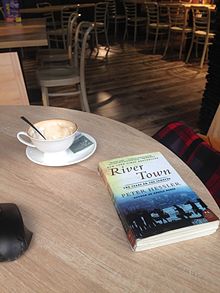River Town: Two Years on the Yangtze

A copy of Peter Hessler's book River Town in a Fuling restaurant
|
|
| Author | Peter Hessler |
|---|---|
| Country | United States of America |
| Language | English |
| Subject | Chinese memoirs about two years spent in Fuling, China as an English teacher |
| Genre | nonfiction |
| Set in | China |
| Published | 2001 |
| Publisher | Harper Perennial |
| Pages | 399 |
| Awards |
Kiriyama Prize New York Times Notable Book |
| ISBN | |
| Website | Peter Hessler's Official Web Page |
River Town: Two Years on the Yangtze is a 2001 book by Peter Hessler. It documents his Peace Corps teaching assignment at Fuling Teachers College in Fuling, Sichuan, which started in 1996 and lasted for two years; Fuling is now part of Chongqing municipality.
The book is a Chinese memoir of his experience in Fuling, told in first person. The language used in the book is deliberately informal and it brilliantly succeeds in directly conveying the beauty of the city and the poignancy of the stories. One of the greatest features of the book lies in each of its chapters being capable of being read randomly without becoming confused. Most characters only appear inside a single chapter — or a few contiguous chapters — while just a few main characters appear throughout the book.
The main characters are:
The author also uses many Chinese terms (normally italicized) to refer to common things or people, in order to make them look more typical of Chinese culture. For instance, foreigners are often referred to as waiguoren, girls are called xiaojies, porters are called stick-stick soldiers (translated literally from the Sichuanese term 棒棒军 bàngbàngjūn), and so on.
Each chapter also includes a short annexe which describes Fuling's most notable places in the present tense, whilst normal chapters are set in the past and use the past simple, present perfect and past perfect tenses.
In the book it is also common to find excerpts from writing assignments given to Chinese students. Those short pieces and excerpts are pregnant with their stories, feelings and thoughts, that help the reader (as the author before) to discover hidden private stories about Chinese life.
The goal of the book partly seems to be to recount the author's experience in Fuling, but mostly it seems to be aimed at telling the locals' stories inside the setting of the author's life in Fuling. Many stories are nicely heavy with poignancy: for instance, the priest of the Catholic church, 李海若 (Lihǎiruò) has beautiful innocence and a poignant past. Moving stories are also those of some of his students, who came from deprived peasant homes in Sichuan countryside and tried do deal with a tough schooling system. Some of his students (mostly women) had abortions or committed suicide. The author manages to go over the "unemotional veneer" that the Chinese presented to the outside world and discover real China.
...
Wikipedia
